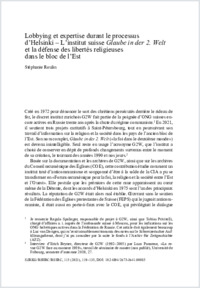Lobbying et expertise durant le processus d’Helsinki. L'institut suisse Glaube in der 2. Welt et la défense des libertés religieuses dans le bloc de l'Est
BHT
- Roulin, Stéphanie ORCID Université de Fribourg, Faculté des Lettres
- 2021
Published in:
- Schweizerische Zeitschrift für Religions- und Kulturgeschichte. - 2021, vol. 115, p. 119-135
Organisation non gouvernementale (ONG)
droits humains
liberté religieuse
Helsinki
Conseil oecuménique des Eglises (COE)
CSCE
English
Among the human rights organisations that worked on the fringes of the Helsinki process (1975–1990), the Zurich-based institute Glaube in der Zweiten Welt (G2W) holds a special place. Founded in 1972 to document violations of religious freedom in the Eastern Bloc, it developed after the turnaround of 1989–1991 into an ecumenical forum «for faith, religion and society between the East and the West». Its main partners have either disappeared with the USSR, or evolved towards the defense of an ultraconservative Christianity. This contribution examines the milestones of this conversion, for which the change of generation at the head of the institute in 1991 does not offer a sufficient explanation. It postulates that a shift had already taken place in the mid-1970s in the «arm wrestling» to put religious freedom on the agenda of the World Council of Churches (WCC) and to anchor it in the Conference on Security and Cooperation in Europe (CSCE). G2W has grown from an anticommunist and offensive lobby group to a recognised expert in the last Helsinki followup meetings. Putting into perspective the interpretations that reduced it to a purely political enterprise, the analysis of G2Ws network and modus operandi also reveals the limits of a commitment whose effects could only be indirect due to a lack of access to the CSCE implementation tools.
- Faculty
- Faculté des lettres et des sciences humaines
- Department
- Département d'histoire contemporaine
- Language
-
- French
- Classification
- History
- License
-
License undefined
- Open access status
- green
- Identifiers
- Persistent URL
- https://folia.unifr.ch/unifr/documents/313137
Statistics
Document views: 96
File downloads:
- roulin_szrkg_rshrc_2021: 132
